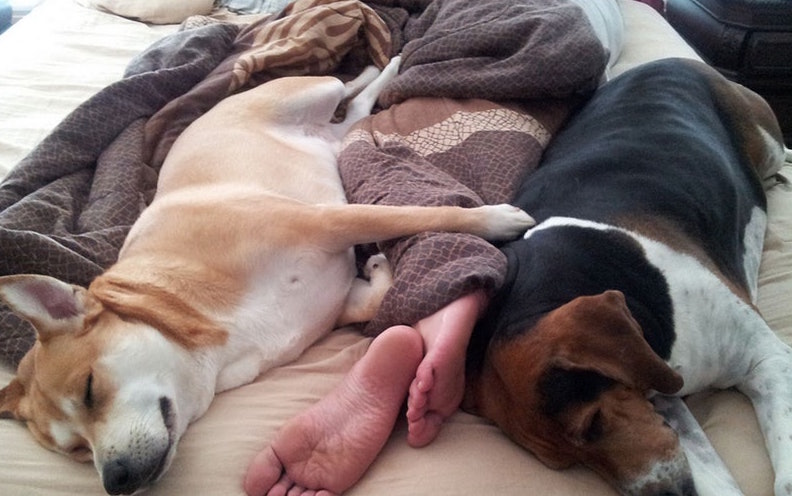We often consider our dogs as part of our family, so naturally, want to spend as much time as possible with them. This often extends through the night while we sleep, but is it a good idea to share the same sleeping space as our pets?
We’ve highlighted the key pros and cons that you need to consider and be aware of.
Is a dog's sleeping pattern different?
Dogs sleeping habits do differ from humans because they tend to sleep much more frequently during the day with the average dog easily being able to rack up 12 to 14 hours of sleep.
Just like humans, the younger the dog, the more they will need to sleep through the day.
Dogs also have REM sleep where they get their most effective rest which means they are more than capable of sleeping through the whole night while you share the same bed, so you don't need to worry about them waking up hours earlier than you.
Even after this, they will have a few more hours of sleep to catch up on throughout the rest of the day.
Benefits of sharing a bed with your dog
1. Safety
Not every pet dog is going to behave like a trained guard dog, but you’ll sleep better knowing that if there's any trouble, that not only will your dog provide safety but often be the first to hear and react to any danger.
Also if you’ve previously had your house burgled, it can be hard to fall asleep due to anxiety but sharing a bed with your dog can relax you because you feel safer even if you’re in the deepest of sleep. This added assurance also improves the quality of your sleep.
2. Warmth
If you are someone that naturally is cold at night no matter what you do then sharing a bed with your dog could be the right solution for you.

Dogs excel at keeping themselves warm because they're naturally wild animals that are used to being outside, so they have thick skin to keep them warm. They also have individual layers that trap heat which will warm up the bed to keep your warmer.
You need to ensure that your sleeping environment isn’t too warm for them or they may begin to overheat throughout the night because they don’t need to be covered in heavy blankets as humans do.
3. Insomnia
Insomnia can be a crippling life disorder causing people to have trouble falling to sleep without the assistance of potent prescription drugs.
Sleeping with a dog can make you less anxious and more relaxed making it easier to fall asleep. Merely sharing a bed with someone else and having the white noise of hearing their breathing around you can help you to fall asleep.
Insomnia can lead to long term serious health issues and sharing the bed with your dog can decrease the effect of the symptoms.
4. Depression
If you suffer from depression then you know it can be difficult to get out of bed and have a positive mindset, especially if you live alone and you fall into a depressive mood.
Having a pet around you can help you through this period because looking after a pet gives you a purpose and overall motivation.
Sharing a bed with a dog can eliminate the feeling of loneliness and motivates you knowing that the dog needs you to survive through the day.
Drawbacks of sharing a bed with your dog
1. Allergies
If you suffer from allergies, then allowing your pet to sleep in the same bed as you can cause you to suffer from more allergic reactions.
This is because they can bring in allergens or mites that attach themselves to the skin of your pet and then bring them into your home. Allergies can negatively affect the quality of your sleep that you experience.
If you suffer from allergies such as hayfever, then this can be triggered if your pet brings pollen into the bed after being outside in grass which then clings to your bed linen.
2. Sleep Disturbance
Not all pets are going to be restful and sleep in the same position for the whole night. This could include constant jumping and rolling which can disturb your REM sleep throughout the night.
This can cause you to wake up in the morning feeling groggy and tired. We recommend that if you have a restless pet, then you should refrain from sharing a bed unless their constant movement doesn’t wake you up.
3. Cleanliness
Pets will naturally have bacteria and dirt that cling to them after being outside in woodland and running through mud etc. This is then brought into the home and then into the bed.
This means that this additional dirt will be present in your bed. All this means is that you will have to wash your sheets more regularly to keep your sleeping environment as fresh as possible.
A UK study found that 31% of owners never bathed their dogs which highlights this issue further.
For this reason, you shouldn’t allow young infants or children to share a bed with a pet because they’ll be at more risk because of the germs that pets carry. Also because pets can bring the risk of smothering caused by them rolling on top of your baby or infant and blocking their airways.
4. Interrupt Couples
If you share a bed with your partner then having a pet sleep in your bed can affect your love life if it is continuously in the room.
You need to ensure that both of you agree to have the pet in the bed; otherwise, this can lead to arguments in your relationship. You need to make sure that the agreement works for both of you.

5. Releases the Boundaries
One of the main reasons you need to consider whether you let your pet sleep in your bed is because of the boundaries. As soon as you let them sleep in your bed, they will think this is normal and want to sleep there every night, getting used to the new arrangement.
You could find it difficult if there are nights that you want to spend alone, which can cause distress for the dog and lead to it scratching at the door trying to get into the bedroom. The dog can develop sleep anxiety where it now can’t settle alone, so you need to consider this.
